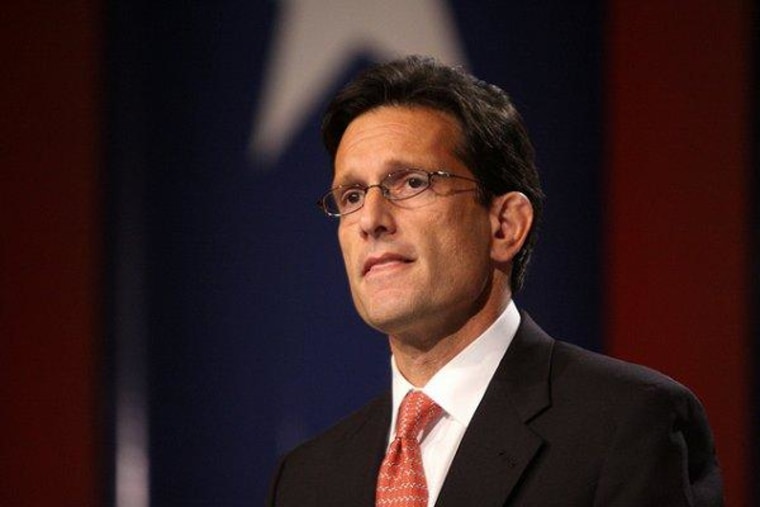After digesting their 2012 setbacks, Republicans are absolutely convinced that the only thing standing between the party and electoral success is better rhetoric -- the public would love the far-right agenda, if only GOP officials presented it in a more compelling fashion.
With this in mind, House Majority Leader Eric Cantor (R-Va.) is taking this theory for a test drive this afternoon, speaking at a conservative think tank about why he thinks his governing vision should be more popular. I obviously can't critique a speech that hasn't been delivered, but the Wall Street Journal and Politico have published lengthy pieces on Cantor's message and rebranding strategy -- and the phrase "plus ca change" keeps coming to mind.
Cantor plans to introduce his vision of America in a Tuesday speech at the conservative American Enterprise Institute. It includes granting more visas for highly educated workers, eliminating medical-device taxes and simplifying tax filings. His aides concede that all he's doing is "taking policies that have been on the shelf for a while, or back burner, and elevating them." He's not completely abandoning Republicans' core focus on slashing spending, just pairing it with other more palatable talk.
So, Eric Cantor's idea for GOP rebranding is rehashing old ideas -- with similar rhetoric -- that he thinks voters may have forgotten about. That some of the ideas -- including giving public funds to private schools through vouchers -- are wildly unpopular doesn't seem to faze him.
Indeed, the Majority Leader's team isn't even trying to maintain the pretense of fresh and creative thought. Politico added that "much of what Cantor will say Tuesday is a rehash of what he's advocated over the past few years," and some of the ideas he presents "will not be introduced" as legislation.
This is shaping up to be a poll-tested sham, and a fairly weak one at that.
But to a very real extent, Cantor's new pitch reinforces larger concerns about the state of contemporary conservatism and the future of the GOP.
First, for all the talk about improving and reforming the party after yet another election cycle in which Republican struggled, Cantor's big idea is presenting old ideas in slightly different packaging -- and that speaks to the party's intellectual stagnation. As Kevin Drum noted yesterday, In other words, just like Bobby Jindal, who made a big show of telling Republicans to stop being the 'stupid party' without suggesting even the tiniest change in actual Republican ideology, Cantor is making a big show of telling Republicans to talk differently without suggesting even the tiniest change in the substance of how they act. Good luck with that."
Second, Cantor's speech is ostensibly about all of the benefits middle-class families can expect to find in the Republican agenda, but that's an awfully tough sell. Josh Barro and Ramesh Ponnuru recently had a fascinating back-and-forth conversation about whether it's even possible for contemporary conservatism to accept policy measures that would make a positive, material difference in the lives of America's middle class, and the conclusion quickly became obvious: it's not possible.
And third, Cantor's preoccupation with GOP rebranding is getting a little out of hand. Long-time readers may recall that this is a subject I've followed with some interest in recent years, and the pattern is hard to miss: every time Republicans suffer an electoral setback, there's Eric Cantor launching yet another rebranding initiative. From the "National Council for a New America" to the "Young Guns" to "Cut and Grow," the Virginia Republican's sole focus in recent years is the value of his party's sales pitches.
I don't imagine the Majority Leader wants my advice, but I'd suggest he spend less time thinking about brands and more time thinking about public policy.
